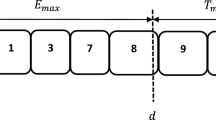Abstract
We extend the classical single-machine maximal lateness scheduling problem to the case where the job processing times are controllable by allocating a continuous and nonrenewable resource to the processing operations. Our aim is to construct an efficient trade-off curve between maximal lateness and total resource consumption using a bicriteria approach. We present a polynomial time algorithm that constructs this trade-off curve assuming a specified general type of convex decreasing resource consumption function. We illustrate the algorithm with a numerical example.
Similar content being viewed by others
References
Alidaee, B., & Ahmadian, A. (1993). Two parallel machine sequencing problems involving controllable job processing times. European Journal of Operational Research, 70, 335–341.
Cheng, T. C. E., & Kovalyov, M. Y. (1995). Single machine batch scheduling with deadlines and resource dependent processing times. Operations Research Letters, 17, 243–249.
Cheng, T. C. E., Janiak, A., & Kovalyov, M. Y. (1998). Bicriterion single machine scheduling with resource dependent processing times. SIAM Journal on Optimization, 8(2), 617–630.
Daniels, R. L., & Sarin, R. K. (1989). Single machine scheduling with controllable processing times and number of jobs tardy. Operations Research, 37(6), 981–984.
Hoogeveen, H., & Woeginger, G. J. (2002). Some comments on sequencing with controllable processing times. Computing, 68, 181–192.
Jackson, J. R. (1955). Scheduling a production line to minimize maximum tardiness. Management Sciences Research Project, Research Report 43, UCLA.
Janiak, A. (1987). One-machine scheduling with allocation of continuously-divisible resource and with no precedence constraints. Kybernetika, 23(4), 289–293.
Janiak, A., & Kovalyov, M. Y. (1996). Single machine scheduling subject to deadlines and resource dependent processing times. European Journal of Operational Research, 94, 284–291.
Karush, W. (1939). Minima of functions of several variables with inequalities as side conditions. MS thesis, Department of Mathematics, University of Chicago.
Kaspi, M., & Shabtay, D. (2006). A bicriterion approach to time/cost trade-offs in scheduling with convex resource-dependent job processing times and release dates. Computers and Operations Research, 33(10), 3015–3033.
Kuhn, H. W., & Tucker, A. W. (1951). Nonlinear programming. In Proceedings of the second symposium (pp. 481–492). Berkeley: University of California Press.
Lee, C. Y., & Lei, L. (2001). Multiple-project scheduling with controllable project duration and hard resource constraint: some solvable cases. Annals of Operations Research, 102, 287–307.
Monma, C. L., Schrijver, A., Todd, M. J., & Wei, V. K. (1990). Convex resource allocation problems on directed acyclic graphs: duality, complexity, special cases and extensions. Mathematics of Operations Research, 15, 736–748.
Ng, C. T. D., Cheng, T. C. E., Kovalyov, M. Y., & Lam, S. S. (2003). Single machine scheduling with a variable common due date and resource-dependent processing times. Computer and Operations Research, 30, 1173–1185.
Nowicki, E., & Zdrzalka, S. (1990). A survey of results for sequencing problems with controllable processing times. Discrete Applied Mathematics, 26, 271–287.
Shabtay, D. (2004). A single and a two-resource allocation problem for minimizing the maximal lateness in a single machine-scheduling problem. Computers and Operations Research, 31(8), 1303–1315.
Shabtay, D., & Kaspi, M. (2004). Minimizing the total weighted flow time in a single machine with controllable processing times. Computers and Operations Research, 31(13), 2279–2289.
Shabtay, D., & Steiner, G. (2007). A survey of scheduling with controllable processing times. Discrete Applied Mathematics, 155(13), 1643–1666.
Shabtay, D., & Steiner, G. (2007, in press). Single machine batch scheduling to minimize total completion time and resource consumption costs. Journal of Scheduling.
Shakhlevich, N. V., & Strusevich, V. A. (2006). Single machine scheduling with controllable release and processing times. Discrete Applied Mathematics, 154, 2178–2199.
Van Wassenhove, L., & Baker, K. R. (1982). A bicriterion approach to time/cost trade-offs in sequencing. European Journal of Operational Research, 11, 48–54.
Vickson, R. G. (1980). Two single machine sequencing problems involving controllable job processing times. AIIE Transactions, 12(3), 258–262.
Author information
Authors and Affiliations
Corresponding author
Rights and permissions
About this article
Cite this article
Yedidsion, L., Shabtay, D. & Kaspi, M. A bicriteria approach to minimize maximal lateness and resource consumption for scheduling a single machine. J Sched 10, 341–352 (2007). https://doi.org/10.1007/s10951-007-0044-6
Published:
Issue Date:
DOI: https://doi.org/10.1007/s10951-007-0044-6




